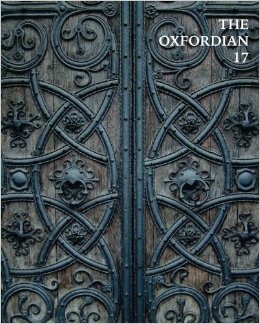
The Shakespeare Oxford Fellowship journal, The Oxfordian 17, produced under the leadership of new editor, Chris Pannell, is now available online to SOF members at The Oxfordian, password protected under the Publications tab on the SOF website.
The hardcopy edition of The Oxfordian 17 may be ordered from Amazon at a cost of $12.99. It is also available from Amazon in the UK, Canada (UPDATE: as of 10/13/15), and the EU.
A Kindle version is not available. To read the online edition, join SOF online at JOIN US.
[box type=”success” align=”alignright” ]The Oxfordian links:
The Oxfordian 17 Online to members
The Oxfordian 17 Hardcopy from Amazon.com
The Oxfordian 17 Hardcopy from Amazon.ca
The Oxfordian 17 Hardcopy from Amazon.co.uk
G.A. Ready’s “Honest Ben . . .” freely available
The Oxfordian 16 now freely available[/box]
This is the first edition of The Oxfordian released under the new SOF membership policy that provides members electronic access to SOF publications, but does not provide hard copy editions free of charge as in the past. For more information about this project, see “Brief Chronicles VI available from Create Space.”
This edition of The Oxfordian under Chris Pannell’s direction includes three remarkable articles that place the Oxfordian movement firmly in modern context from researchers James Warren, Michael Dudley, and Don Rubin. They include, according to Pannell’s description:
“Knowledge Ill-Inhabited: The Subjugation of Post-Stratfordian Scholarship in Academic Libraries.” by Michael Dudley
Dudley examines the influence of Library Sciences on the Shakespeare authorship question. He reviews the cataloguing practices of the Library of Congress, the purchasing practices of modern libraries, and the relationships between English departments and the management of their libraries in a university context. He surveys the terrain for post-Stratfordian titles and Stratfordian titles within the library environment and comes to some fascinating and chilling conclusions. Along the way, he discusses the politics of academic dissent, and examines how the placement of a book within a library system, can confer or deny meaning, with far-reaching consequences for Oxfordian theory.
“Oxfordian Theory and Continental Drift” by James Warren
Compares the history of Oxfordianism, beginning with J.T. Looney’s Shakespeare Identified in 1920, with the history of the theory of Continental Drift, first proposed by German geophysicist Alfred Wegener in 1915. Like Oxfordianism, continental drift was initially rejected by geologists and scientists in the early 20th century. Warren outlines several valuable things Oxfordians can learn from the story of how continental drift was gradually accepted by scientists, and after that, by the public at large. He also addresses the issue of methodology in research, especially when belief systems are undergoing change or experiencing pressure to change.
“Spinning Shakespeare” by Don Rubin
Don Rubin has adapted a presentation he gave in October 2012 at the joint conference of the Shakespeare Fellowship and the Shakespeare Oxford Society. In this article he describes his experience at York University of lobbying for departmental approval to teach a course on the SAQ. How he succeeded in delivering such a course (one time!) to 4th year undergraduates. Includes appendixes such as an overview of the course materials, supplementary information on student responses. Article also includes background insights about organizing the SOF’s Toronto conference in 2013 and the sacrifices exacted from academics who speak openly of reasonable doubt about the man from Stratford.
Free article on Ben Jonson
From this edition of The Oxfordian, the SOF has provided a sample article freely available to our readers titled “Honest Ben and the Two Tribes He Hath Left Us” by Gabriel Andrew Ready. This article examines and critiques the publication in 2012 of the Cambridge Edition of the Works of Ben Jonson.
SOF President Tom Regnier said: “I have long been aware of how the Stratfordian presumption skews Shakespearean scholarship. This article shows how it is also skewing Jonsonian scholarship.”
According to Pannell, the article “also brings a fresh analysis and point-of-view to the manner in which Jonson presents himself in the prefatory material of the First Folio” — a topic of great currency with the Folger Shakespeare Library’s First Folio Tour to begin in 2016.
With the publication of The Oxfordian 17, last year’s edition, The Oxfordian 16, is now freely available online.
The Oxfordian 17 contents also include:
“A Newly Discovered Article by J. Thomas Looney” introduction by James Warren
Eighty-percent of this article is a reprint of an essay by J.T. Looney that was published in 1922, in the first issue of a British journal called The Golden Hind. Estimated distribution of the first issue of the magazine was 75 copies. A small part of Looney’s essay was reprinted many years ago in Oxfordian Vistas. In The Golden Hind, the original title was The Earl of Oxford as ‘Shakespeare’: New Evidence. Looney deepens our understanding of the negotiations over Anne Cecil’s engagement to Phillip Sidney (which obviously failed), and explores the ways in which her eventual marriage to Edward de Vere is itself explored in The Merry Wives of Windsor. In his introduction, James Warren provides some provenance for the Looney essay, and describes how he obtained an original copy of this issue of The Golden Hind.
“Is Greene’s Groats-worth of Wit about Shakespeare, or By Him?” by Robert Prechter
An examination of the possible relationship between Robert Greene, William Shakespeare, and Edward de Vere; makes the thesis that neither Greene and Shakespeare existed as writers. Posits that Robert Greene was a pseudonym created by Oxford and that “Shakespeare” was an allonym, undertaken through a connection to the Stratford man. Examines linguistic parallels between Greene’s plays and Shakespeare’s; cites the many dedications attached to Greene’s works that name relations of the 17th Earl of Oxford; builds on work of previous scholars, for example Stephanie Hughes’s “Robert Greene: King of the Paper Stage” (available at www.politicworm.files.wordpress.com)
“A Mint of Phrases in His Brain”: Language, Historiography, and The Authorship Question in Love’s Labour’s Lost by Julie Elb
A historical summary of critical opinions on Love’s Labour’s Lost. This paper reviews the generally negative appraisal of the play over two centuries, as a consequence of misidentification of the author. This has had the result of many critics’ failing to properly evaluate the play’s language and characterizations on their own merits. The paper also examines the way in which this play differs from other Shakespeare comedies, how its sources become easier to understand and relate to the text, how its purpose for being written becomes less problematic, if readers can accept a court insider such as the 17th Earl of Oxford, as the author.
“The Rediscovery of Shakespeare’s Greater Greek” by Earl Showerman
An article that summarizes and updates Showerman’s previously published articles in Brief Chronicles and The Oxfordian on the question(s) of Shakespeare’s knowledge of Greek, his sources, and the literary and linguistic parallels between works by Sophocles, Euripides, and Aeschylus and Shakespeare plays such as Hamlet, Macbeth, Timon of Athens, The Winter’s Tale, and Much Ado About Nothing.
“Subliminal Chaucer in Shakespeare’s History Plays” by Michael Delahoyde
Delahoyde begins by addressing the relatively few studies of Chaucer’s influence on Shakespeare’s writing, and of these, he notes how they only address the obvious connections between Chaucer’s Troilus and Criseyde and Shakespeare’s Troilus and Cressida and also between Chaucer’s The Knight’s Tale in The Canterbury Tales and Shakespeare’s The Two Noble Kinsmen. Shakespeare, however has employed his knowledge of Chaucer in many more ways, and in more subtle ways, than has been previously detected. By making connections between many of Chaucer’s lesser-known works and Shakespearean works, he adds significantly to our understanding of the writerly relationship between the two founding figures in the English canon.
Finally, “My Oxfordian Bookshelf,” a new column that will feature reviews of favorite Oxfordian books from the past, debuts with Chris Pannell’s delightful review of Lynne Kositsky’s Shakespeare authorship fantasy for younger readers, A Question of Will.
[box type=”shadow” align=”alignright” width=”100″ ]Letter From The Oxfordian Editor Chris Pannell:

If great writing seems to come from a mysterious place, I’m fine with that.
It doesn’t really, of course. It comes from the mingling of personal experience, training in literature and languages, curiosity, ambition, emotion, and hard work. The only ones who believe in the mysteriousness of creative writing, are those who haven’t tried it, or felt what it’s like to grapple with it.
One is always grappling. The subjects aren’t chosen by the writer, so much as they are forced upon the writer by the injuries and pleasures of his or her life. Memory, in other words. This is part of my impetus to understand Shakespeare through Oxford’s life. I want to observe, with a feeling of fresh clarity, those mysteries about Oxford’s role in the Elizabethan era falling away.
The writers and researchers whose work has filled the seventeenth issue of The Oxfordian, are helping do that. They’re on a quest, perhaps for similar reasons I am.
These were main tasks:
- reading and thinking about the submissions
- sending back work with ideas for refinements
- debating with the editorial board
- accepting and rejecting articles
- assembling the articles into a laid-out book (on deadline)
There were days when I felt like I was clutching the reins of eight horses pulling a rickety old wagon, while trying to keep the vehicle from going off the road and throwing me in the ditch.
Not many days were so action-packed. Mostly I enjoyed hearing so many people – we had twenty-three submissions — talking about Oxford in such a variety of voices, pursuing such a range of inquiries, getting closer and closer to the source of the Shakespeare plays and poems.
My goal is to make The Oxfordian as great a journal as it can be. Of course I’m utterly dependent on the writers who want to publish, who want to improve their work, and better understand the greatest writer in the English language. I’m thrilled my job lets me read many Oxfordian articles before anyone else.
I want to thank all the writers who sent something. Those writers with work in the seventeenth issue of The Oxfordian, have provided readers with much that is exciting and ground-breaking.[/box]
